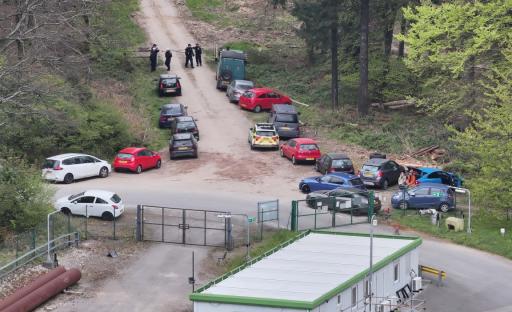A Calgary physician says it's just a matter of time before Alberta experiences the dire COVID-19 situation Ontario is battling right now.
Read more: Hundreds of COVID-19 ICU patient transfers planned as Ontario braces for ‘horrific’ 2 weeks
“General internists, colleagues in intensive care units are sending out distress signals. That's going to happen here. It doesn't have to happen,” said Dr. Gabriel Fabreau, an assistant professor at the University of Calgary and researcher at the O'Brien Institute for Public Health.
“Every one of us that's had a palliative family member on Facebook, Zoom — that leaves scars.
“I don't know how to tell people that other people matter.
“That's going to happen,” Fabreau said.
As of Thursday in Ontario there were 2,350 people hospitalized with COVID-19, with an all-time high of 806 patients in intensive care units and 588 patients in ICUs on a ventilator.
Fabreau was one of the doctors who had been working to bring the COVID-19 vaccine clinic to the Cargill plant.
He provided scientific evidence in meetings with employers, Alberta Health Services and newcomer-focused organizations to advocate for a targeted immunization program at sites like meat-packing plants that are over-represented by immigrants and newcomers.
Read more: Plans underway for COVID-19 vaccination clinic at southern Alberta meat-packing plant
“There's mounting evidence to support targeting high-risk locations and essential frontline workers,” Fabreau told Global News on April 8. “All of them will help to dramatically reduce the chains of transmission.”
Read more: Vaccination clinic at Alberta’s Cargill meat-packing plant postponed
Fabreau said the rise in variant cases in the province “has dramatically changed the playing field.”
On Friday, Alberta Health said 60.4 per cent of active COVID-19 cases involved variants of concern.
The province confirmed 1,690 new cases of COVID-19 in the last 24 hours.
Over that time period, Alberta identified 1,184 additional cases involving variants.
As of Friday, there were 549 Albertans in hospital with the disease, including 125 in ICU. That was a jump from 518 hospitalizations on Thursday and 116 ICU patients.
Read more: COVID-19: Critical care nurses in high demand in Ontario as 3rd wave puts pressure on hospitals
“It's important to remember that hospitalizations are a lagging indicator and these individuals in hospital were likely first infected around two to three weeks ago.,” Dr. Deena Hinshaw said Thursday.
“Given how high our leading indicators — growth rate, new cases and positivity rate — have been, we can expect to see this number grow in the coming days.
“We must bend this curve down to prevent these severe outcomes and the subsequent impact on our health-care system,” Alberta's chief medical officer of health said.
In order to manage increasing numbers of COVID-19 patients, Alberta hospitals have to expand capacity somehow, Hinshaw explained.
“The way to expand capacity is to unfortunately stop or delay treatment for other types of health conditions.
“I want to reiterate that as cases expand, the impact on hospitals means not just that there's more people who require that COVID-19 treatment, but also that there's less access to other kinds of treatment because it's only by delaying those kinds of other treatments that there are those available staff and other capacity resources to be able to redeploy if there is a surge of COVID-19 patients.”
AHS told Global News on Friday that there is no specific tipping point for postponing or cancelling other, non-emergent surgeries.
“Just like the first and second waves, there isn't a definitive threshold,” an AHS spokesperson said. “When pressure on the system increases to a point where we need to postpone surgeries and other procedures, we will.”
Read more: COVID-19: Alberta identifies 1st case of B.1.617 variant as province confirms 1,857 new cases
“There's multiple fallibilities of humans that don't want to believe COVID exists, but it does,” Fabreau said.
“Everyone is exhausted, everyone is tired of this pandemic, which is true, but that doesn't make it go away.
Read more: Tightened COVID-19 restrictions in Alberta ‘a possibility’ but not recommended right now: Shandro
“The variants are more transmissible, we know this, so using the same tactics as last time when you're facing the variants that are now dominant, that we knew would become dominant, and are now 50 to 60 per cent more transmissible and more virulent — meaning they cause more death and more ICU and more morbidity — means essentially we have a plan for failure.
“I think things are going to get much worse in Alberta before we take notice.
“That means more are going to get sick, they're going to become disabled, they're going to be on ventilators,” Fabreau said.
“People in the hospitals, we're already tired. We're going into the third period tired. No matter what we do now, it's going to be worse.
“We're looking at Ontario and there's this resignation — it's the overwhelming sense that we're going to show up and we're going to do our best but we also have to watch all this suffering and it doesn't have to happen.”
View link »


